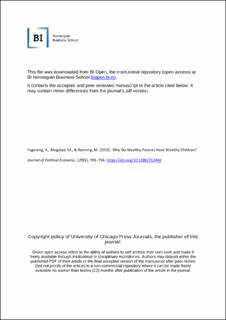| dc.contributor.author | Fagereng, Andreas | |
| dc.contributor.author | Mogstad, Magne | |
| dc.contributor.author | Rønning, Marte | |
| dc.date.accessioned | 2023-08-02T09:17:03Z | |
| dc.date.available | 2023-08-02T09:17:03Z | |
| dc.date.created | 2020-11-25T10:12:18Z | |
| dc.date.issued | 2021 | |
| dc.identifier.citation | Journal of Political Economy. 2021, 129 (3), 703-756. | en_US |
| dc.identifier.issn | 0022-3808 | |
| dc.identifier.uri | https://hdl.handle.net/11250/3082282 | |
| dc.description.abstract | We show that family background matters significantly for children’s accumulation of wealth and investor behavior as adults, even when removing the genetic connection between children and the parents raising them. The analysis is made possible by linking Korean-born children who were adopted at infancy by Norwegian parents to a population panel data set with detailed information on wealth and socio-economic characteristics. The mechanism by which these Korean- Norwegian adoptees were assigned to adoptive families is known and effectively random. This mechanism allows us to estimate the causal effects from an adoptee being raised in one type of family versus another. | en_US |
| dc.language.iso | eng | en_US |
| dc.publisher | University of Chicago Press | en_US |
| dc.title | Why Do Wealthy Parents Have Wealthy Children? | en_US |
| dc.type | Journal article | en_US |
| dc.type | Peer reviewed | en_US |
| dc.description.version | acceptedVersion | en_US |
| dc.source.pagenumber | 703-756 | en_US |
| dc.source.volume | 129 | en_US |
| dc.source.journal | Journal of Political Economy | en_US |
| dc.source.issue | 3 | en_US |
| dc.identifier.doi | 10.1086/712446 | |
| dc.identifier.cristin | 1852057 | |
| dc.relation.project | Norges forskningsråd: 287720 | en_US |
| dc.relation.project | Norges forskningsråd: 236921 | en_US |
| cristin.ispublished | true | |
| cristin.fulltext | postprint | |
| cristin.fulltext | original | |
| cristin.qualitycode | 2 | |
